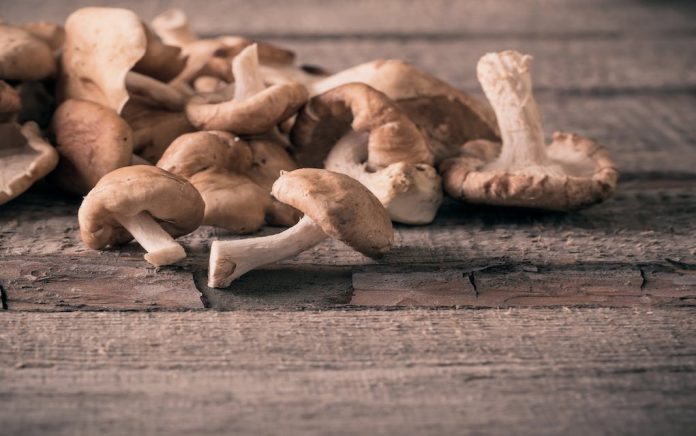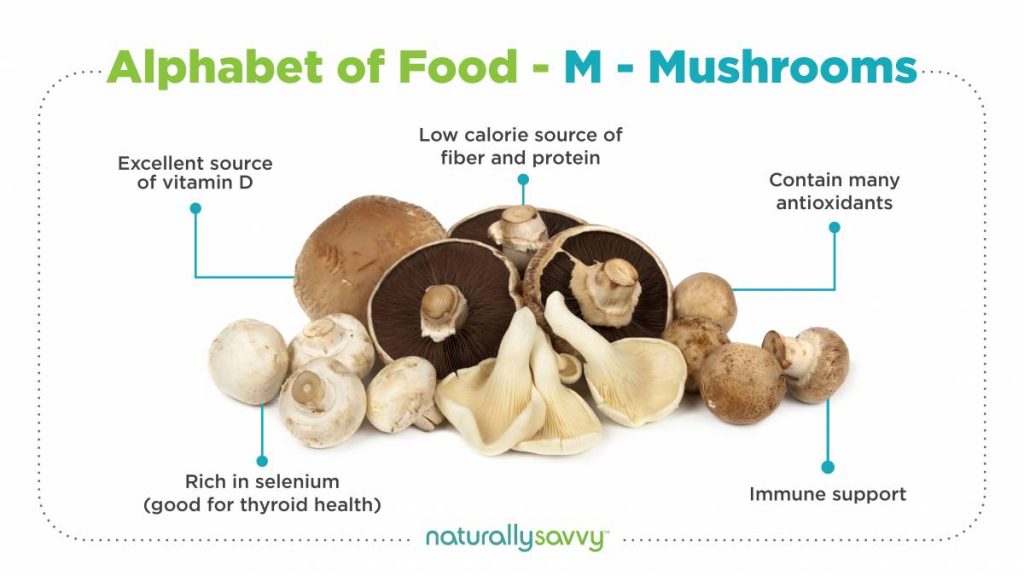
Mushrooms have many health benefits and are therefore considered to be super foods, since about half of all edible varieties have been shown to have a potentially positive impact on our health in addition to providing great nutrients. This suggests that mushrooms are good for you and as a result there are countless reasons why you should eat more mushrooms and find some novel ways to include them in your daily diet.
Of the roughly 10,000 different mushroom species in North America, more than 70 percent are inedible for one reason or another. Of the remaining 30 percent, the majority are edible but essentially tasteless, which leaves about 4 percent that are yummy and great for recipes.
However, being yummy is not a necessary criterion when it comes to recommending eating mushrooms for health reasons. In fact, some of the healthiest mushrooms may be best consumed as a supplement because they are not especially tasty and/or easy to chew.
General Mushroom Health Benefits
Mushrooms are filled with nutritional value. Overall, mushrooms are low in calories (and can help with weight loss), are a great source of fiber, provide some protein, and are a good way to get antioxidants and various other nutrients, including B vitamins, copper, potassium, selenium, and vitamin D. They also act as prebiotics, which means they provide nourishment to the probiotics in your gut.
Read about mushrooms prove as effective as vitamin D supplements
One of the more significant benefits of mushrooms is their anticancer abilities. Proteins in mushrooms called lectins have the ability to attach themselves to abnormal cells—including cancer cells—and target them for destruction by the immune system. Cancers that are in the bullseye of these lectins include breast, liver, uterine, pancreatic, gastric, and acute leukemia.

But do different mushrooms offer different benefits? Yes, and some more than others. So here are 7 different fantastic fungi and some of the specific health advantages each of them provide.
Chaga Mushroom Health Benefits
Chaga (Inonotus obliquus) mushroom has a hard texture, a characteristic that makes it perfect for grinding into a powder and enjoyed as a tea or dietary supplement, which is how many people do experience this mushroom. The mushroom grows on birch trees and contains a variety of substances that contribute to its health benefits, such as botulin, betulinic acid, melanin, and inotodiol.
Melanin is a natural pigment and antioxidant that is found in high levels in this fungus. The benefits of Chaga users may experience include help with cardiovascular health, immune health, cholesterol, diabetes, and protection against DNA damage.
Chanterelle Mushroom Health Benefits
Chanterelle mushrooms may not be a variety with which you are familiar, but after reading about their health benefits, you may want to seek them out. These fungi have among the highest known natural concentration of B12 vitamins, which are critical for nervous system health and for transforming food into energy and thus may help with weight loss. Other bennies from chanterelle mushrooms include antibacterial, antifungal, and antimicrobial properties along with being high in vitamins C and D as well as potassium. Other interesting features of these trumpet-looking mushrooms are their wound-healing and anti-inflammatory properties, which were demonstrated in a recent animal study.
Maitake Mushroom Benefits
If you want a mushroom that may help control blood sugar, then maitake (Grifola frondosa) should be your choice. A number of recent studies have shown that extracts of this mushroom can benefit people who have insulin resistance and diabetes as well as help in the fight against obesity, which is a common characteristic among people with diabetes.
Maitake mushrooms also have demonstrated anticancer activity. A substance called D-fraction found in maitake could be helpful in preventing and treating breast cancer by interfering with the growth and reproduction of cancer cells. These mushrooms also have been able to suppress tumor growth in mice.
Read about 6 reasons to love Portobello mushrooms
Oyster Mushroom Health Benefits
Oyster mushrooms are among those highest in protein (30% by dry weight) and contain a significant amount of lovastatin, a cholesterol-lowering substance. Another health benefit associated with oyster mushrooms is an anti-retroviral trait that may be helpful in fighting HIV. An anticancer property also revealed itself when researchers found that extracts of the mushrooms inhibited the growth of breast and colon cancer cells.
Lion's Mane Mushroom Health Benefits
Lion’s Mane (Hericium erinaceus) is another beneficial mushroom. It is known to support stomach and liver function, thereby serving as a digestive aid. It contains compounds called diterpenes have a positive impact on mood and support brain health and memory.
It is also known to support immune function and provides nutrients that have antioxidant, antibacterial and anti-aging properties.

Reishi Mushroom Health Benefits
The reishi mushroom is an ancient symbol of longevity and was once eaten only by royalty. Today, people everywhere enjoy reishi mushrooms for their immune-enhancing abilities and antibacterial, antiviral, antifungal, and anticancer powers. The mushroom also is high in ganoderic acid, which can help fight cancer as well as lower blood pressure and cholesterol. Some studies also suggest reishi mushrooms may help in the battle against neurodegenerative conditions such as Alzheimer’s disease.
Shiitake Mushroom Benefits
Shiitake mushrooms (Lentinula edodes) are perhaps best known for their ability to enhance immune system function. In a University of Florida study, investigators found that eating shiitake mushrooms every day can improve immune function. The benefits were seen in various areas, including increased cell proliferation and enhanced secretory immunoglobulin A levels, which indicated improved gut immunity.
Other benefits of shiitake mushrooms include its high content of vitamin D, the presence of lentinan (an anti-tumor substance), and an ability to reduce inflammation. In the latter case, healthy adults who consumed 4 ounces of dry shiitake mushrooms daily for one month showed a reduction in inflammation and inflammatory substances.
Bottom line
Whenever possible, incorporate these and other mushrooms into your diet and/or supplement program. Mushrooms can be a delightful addition to soups, salads, stews, stir-fries, sandwiches, and grain and vegetable side dishes. If these fungi are not your idea of fun, then look for supplements in the form of powders, teas, capsules, extracts, and tablets.
Mushroom Recipe Ideas
Lamb Leg Steak With Maple Chevre Shiitake Sauce
Sources
Alonso EN et al. Genes related to suppression of malignant phenotype induced by maitake D-fraction in breast cancer cells. Journal of Medicinal Food 2013 Jul 22; 16(7)
Aoki H et al. Grifola frondosa (maitake) extract activates PPARo and improves glucose intolerance in high-fat diet-induced obese mice. Bioscience, Biotechnology and Biochemistry 2018 Sep; 82(9): 1550-59
Chuang MH et al. The lifespan-promoting effect of acetic acid and Reishi polysaccharide. Bioorganic & Medicinal Chemistry 2009 Nov 15; 17(22): 7831-40
Dai X et al. Consuming Lentinula edodes (shiitake) mushrooms daily improves human immunity: a randomized dietary intervention in healthy young adults. Journal of the American College of Nutrition 2015; 34(6): 478-87
Huang S et al. Polysaccharides from Ganoderma lucidum promote cognitive function and neural progenitor proliferation in mouse model of Alzheimer’s disease. Stem Cell Reports 2017 Jan 10; 8(1): 84-94
Jedinak A, Sliva D. Pleurotus ostreatus inhibits proliferation of human breast and colon cancer cells through p53-dependent as well as p53-independent pathway. International Journal of Oncology 2008 Dec; 33(6): 1307-13
Masuda Y et al. Oral administration of soluble B-glucans extracted from Grifola frondosa induces systemic antitumor immune response and decreases immunosuppression in tumor-bearing mice. International Journal of Cancer 2013 Jul; 133(1): 108-19
Mushroom the Journal. How many edible/poisonous mushrooms are there?
Nasiry D et al. Anti-inflammatory and wound-healing potential of golden chanterelle mushroom, Cantharellus cibarius (Agaricomycetes). International Journal of Medicinal Mushrooms 2017; 19(10): 893-903
Radwan FF et al. Apoptotic and immune restoration effects of Ganoderic acids define a new prospective for complementary treatment of cancer. Journal of Clinical and Cellular Immunology 2011 Dec 11; S3:4
Schneider I et al. Lipid lowering effects of oyster mushroom (Pleurotus osteatus) in humans. Journal of Functional Foods 2011 Jan; 3(1): 17-24
Watanabe F et al. Characterization of vitamin B12 compounds in the wild edible mushrooms black trumpet (Craterellus cornucopioides) and golden chanterelle (Cantharellus cibarius). Journal of Nutritional Sciences and Vitaminology 2012; 58(6): 438-41
Willard T. Medicinal mushrooms part 7: oyster mushrooms.
Wong C. Health benefits of the chaga mushroom. Very Well Health 2018 Nov 16










